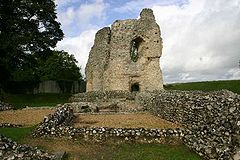Ludgershall railway station
| Ludgershall | |
|---|---|
 Ludgershall Castle |
|
| Ludgershall shown within Wiltshire | |
| Population | 4,427 (in 2011) |
| OS grid reference | SU265508 |
| Civil parish |
|
| Unitary authority | |
| Shire county | |
| Region | |
| Country | England |
| Sovereign state | United Kingdom |
| Post town | ANDOVER |
| Postcode district | SP11 |
| Dialling code | 01264 |
| Police | Wiltshire |
| Fire | Dorset and Wiltshire |
| Ambulance | South Western |
| EU Parliament | South West England |
| UK Parliament | |
| Website | Town Council |
Ludgershall (/ˈlʌɡərʃɔːl/ LUG-ər-shawl, with a hard g) is a town and civil parish 16 miles (26 km) north east of Salisbury, Wiltshire, England. It is on the A342 road between Devizes and Andover. The parish includes the Faberstown housing estate which is contiguous with Ludgershall, and the hamlet of Biddesden which is 1.5 miles (2.4 km) to the east on the border with Hampshire.
There is evidence of settlement in the late Bronze Age or early Iron Age at Windmill Down on the western edge of the parish.
The entry in the Domesday Book (1086) reads as follows: "Edward of Salisbury holds Ludgershall. Alfward held it before 1066; it paid tax for one hide (about 24 acres). Land for 3 ploughs. In Lordship 2 ploughs, 3 slaves; 8 Cottagers with 1 plough. Pasture 3 furlongs long and 1 furlong wide; woodland ½ league long and 2 furlongs wide." The value was 100 shillings.
Ludgershall was originally called "Litlegarsele", often rendered as "lytel", small and "garsheath", a grassy place thus a "small grazing area" or "little grass heath".
In 1141 the Empress Maud took refuge in Ludgershall Castle as she fled from King Stephen's army. She was accompanied by Milo Fitzwalter and escaped disguised as a corpse to Vies (Devizes) and thence to Gloucester. Some 600 years later a seal was found by a ploughman, bearing a knight in armour and holding a lance shield with the inscription "Sigillum Millonis De Glocestria". It is thought Fitzwalter threw away the seal to avoid identification when he escaped as a beggar. During succeeding centuries Ludgershall Castle was occupied by many distinguished persons and royalty frequently resided there. The village grew around the castle.
...
Wikipedia

